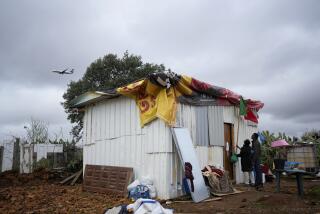Sun Sets on Britain’s ‘Rule’ of Madeira
- Share via
FUNCHAL, Madeira — For 300 years a handful of British families ran Madeira’s economy. Now the sun is finally setting on their colonial-style influence in this Portuguese Atlantic island.
A new breed of businessmen of Portuguese descent, flushed with fortunes made in South Africa, is wresting control of the lush island’s real estate and finances.
In the drawing rooms of Victorian England, ladies sipped Madeira in the mornings. Today, the labels of Madeira’s famed fortified wines still bear the unmistakably British names of Leacock, Miles and Blandy. And a lazy afternoon tea is easy to find in the various villas and gardens still in Anglo-Madeiran hands.
But the big money behind Madeira’s thriving tourism and offshore banking now comes from tough entrepreneurs who learned their business sense as emigrants in Pretoria.
“There’s a lot of potential here,” says South African-born Dionisio Pestana, 39, the island’s leading entrepreneur whose Pestana Group owns half of its five-star hotel beds.
“Circumstances change, generations have different outlooks. A lot of the British families have sold much of their land but don’t have the equity to develop their positions,” he said.
The son of Portuguese emigrants who moved to South Africa, Pestana came to Madeira on a working holiday in 1975 and stayed.
He now has a leisure group worth 14.5 billion escudos ($97 million), 20% of charter airline Air Atlantis and 70% of the Madeira Development Co. setting up Madeira’s free-trade zone. His flagships are the luxury Carlton and Casino Park hotels and he is expanding to mainland Portugal.
Although belonging to Portugal which discovered the archipelago 500 miles off Africa in 1420, Madeira has been inextricably linked to Britain since the 17th Century.
British merchants used it as a port of call on long transatlantic voyages and some settled on Madeira, building up the island’s wine trade, handicrafts and plantations.
Britain occupied Madeira twice militarily in the early 19th Century under the pretext of impending French attacks in the Napoleonic wars.
But the economic supremacy of the close-knit Anglo community declined along with Madeira’s importance as a port after World War II. Newer generations squandered family wealth, left the island or sold off property held for centuries.
Now there are perhaps 200 British residents left, many of them retired and slipping into old age. The English accents in Funchal pubs are more likely to be of package-tour tourists.
“It’s the end of an era,” said one middle-aged member of an Anglo-Madeiran family, sipping a gin in the faded drawing room of a villa overlooking Funchal harbor. “We’re washed up.”
Horacio Roque, one of Portugal’s richest men, has jumped to fill the gap left by the British and take advantage of the drive by Madeira’s autonomous government to develop the backward economy and infrastructure.
“Madeira is a good opportunity. There are still British families which have influence in Madeira but the situation has changed and new groups have arisen,” he said.
Roque has teamed up with Joe Berardo, another self-made man who made a fortune in Africa, to build interests in luxury hotels, the tobacco firm Empresa Madeirense de Tabacos and the Banco Internacional de Funchal.
Berardo, 46, emigrated to South Africa from Madeira in his teens and went into the mining business. He returned to Funchal to buy one of the island’s most sumptuous properties--it once belonged to an English consul.
Enrique Santos, president of the Portuguese-South African Chamber of Commerce in Lisbon, said emotion helps the financial links between Madeira and South Africa.
The number of people of Madeiran descent in South Africa outweighs the 250,000 still on the island, generating big remittances.
The island’s trade links with Pretoria are still negligible, but Santos said he expects them to expand when economic sanctions against South Africa are ended.
More to Read
Sign up for Essential California
The most important California stories and recommendations in your inbox every morning.
You may occasionally receive promotional content from the Los Angeles Times.













